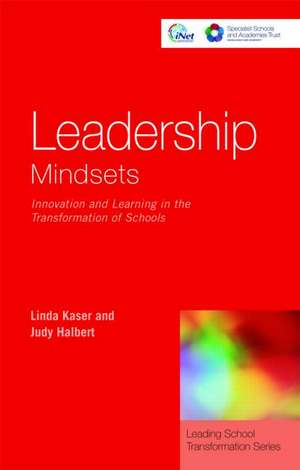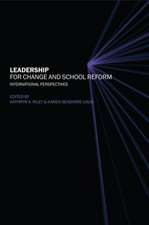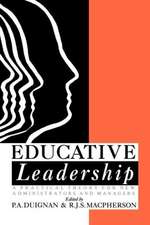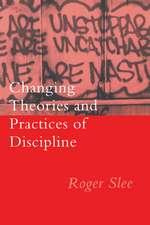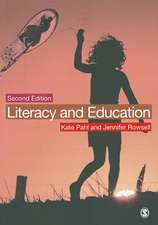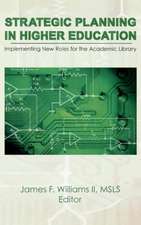Leadership Mindsets: Innovation and Learning in the Transformation of Schools: Leading School Transformation
Autor Linda Kaser, Judy Halberten Limba Engleză Paperback – 20 feb 2009
Drawing from international case study research over many years, from the experience of hundreds of school leaders serving widely diverse communities, Judy Halbert and Linda Kaser argue that there are six distinct mindsets that characterize the way successful, learning-oriented leaders operate and make sense of their professional world. These leaders are:
- motivated by intense moral purpose
- knowledgeable about current models of learning
- consistently inquiry-oriented
- able to build trusting relationships
- evidence-informed
- able to move to wise action.
Preț: 391.60 lei
Nou
Puncte Express: 587
Preț estimativ în valută:
74.93€ • 78.45$ • 62.00£
74.93€ • 78.45$ • 62.00£
Carte tipărită la comandă
Livrare economică 07-21 aprilie
Preluare comenzi: 021 569.72.76
Specificații
ISBN-13: 9780415476942
ISBN-10: 0415476941
Pagini: 184
Ilustrații: 3 b/w images, 3 tables and 3 line drawings
Dimensiuni: 138 x 216 x 13 mm
Greutate: 0.19 kg
Ediția:1
Editura: Taylor & Francis
Colecția Routledge
Seria Leading School Transformation
Locul publicării:Oxford, United Kingdom
ISBN-10: 0415476941
Pagini: 184
Ilustrații: 3 b/w images, 3 tables and 3 line drawings
Dimensiuni: 138 x 216 x 13 mm
Greutate: 0.19 kg
Ediția:1
Editura: Taylor & Francis
Colecția Routledge
Seria Leading School Transformation
Locul publicării:Oxford, United Kingdom
Public țintă
Academic, Postgraduate, Professional, and Professional Practice & DevelopmentCuprins
1. Moving from Sorting to Learning - New Mindsets Required
2. Intense Moral Purpose
3. Trust - Relationships First
4. Inquiry - Questions before Directions
5. Learning for Deeper Understanding
6. Evidence-Seeking in Action
7. Learning-Oriented Design
8. Leadership, Connections and Good Work
2. Intense Moral Purpose
3. Trust - Relationships First
4. Inquiry - Questions before Directions
5. Learning for Deeper Understanding
6. Evidence-Seeking in Action
7. Learning-Oriented Design
8. Leadership, Connections and Good Work
Recenzii
I believe there is a real need for this type of book. It offers different paradigms and lenses through which to view and critique the practice of leadership in schools. The principal markets would be school leaders themselves, but also leadership development providers would find this type of book very useful for the facilitation of reflection around leadership. This book would appeal to middle leaders, senior leaders, and those in headteacher positions to help them make sense of their work in schools.
This book would be intended for the graduate student, experienced leader market. It could well be used as a main text, and definitely as recommended reading by others – I do not see it as a library-only book. Such courses might be: Aspiring leaders courses NZ, Canada, UK, Holland and Australia. MA Pathways courses Institute of Education. Other masters programmes. SSAT leadership development programmes UK.
There are many leadership books around. This book has the particular advantage of being written by two scholar-practitioners who are not only well-versed in academic research and theory, but who are working very closely with individual schools over a numbers of years to get an indepth knowledge and understanding of leadership at the grassroots level. They have seen the development of the leaders themselves, the challenges these leaders are facing and how the six mindsets they are developing through their inquiry-focused network, are useful and how they are played out in practice. They have rich case study material, which readers internationally will enjoy.
I think this book is before its time as some countries still try to think about leadership in terms of imposing standards and technicist processes of developing leadership. In an era where many senior leaders are not choosing headship, a book like this may help them to see school leadership in a different light, and validate the work they do. This book easily has a five-year lifespan.
These authors are recognised and highly credible regionally in Canada and increasingly internationally. They have many international networks of colleagues in leadership development. They have been getting on and doing the work in their own province, not overly concerned about marketing themselves or making their work visible elsewhere, but concentrating supporting and building this network. However, the fruits of their labour are now becoming increasingly apparent and noted. They are the co-conference chairs of the International Congress for School Effectiveness and Improvement Conference in Vancouver January 2008 which will continue to increase their exposure internationally. They are the facilitators and key initiators of the SSAT’s iNet arm – the International Network for Educational Transformation which connects countries such as Chile, New Zealand, Australia, England, Canada, China, Mauritius.
This is a book that leaders will pick up and read because of its proposed length. They will find it interesting because it has five different lenses or mindsets for them to consider their own work in schools. The combined research theory with specific case references will make it appropriate. I believe it has an adequate coverage of subject matter. It is focused and clear in its intent.
I do believe that books such as this proposal puts forward are the way of the future. Much more research is applied research such as this book will describe. Many of our participants in postgraduate study are practising leaders in their schools. There are calls now for books such as this that are well grounded in real research in real schools by people working most closely to those contexts.
Jan Robertson
Director, London Centre for Leadership in Learning, Institute of Education, University of London, UK
"Leadership Mindsets is clearly well written and well structured, interspersed with stories from the field. The authors suggest that this book is for new and experienced, formal and informal leaders. It would also serve well as a text in graduate leadership programs."—Harry Janzen, Education Canada (Winter 2009-2010), Vol. 50, No. 1: 27
This book would be intended for the graduate student, experienced leader market. It could well be used as a main text, and definitely as recommended reading by others – I do not see it as a library-only book. Such courses might be: Aspiring leaders courses NZ, Canada, UK, Holland and Australia. MA Pathways courses Institute of Education. Other masters programmes. SSAT leadership development programmes UK.
There are many leadership books around. This book has the particular advantage of being written by two scholar-practitioners who are not only well-versed in academic research and theory, but who are working very closely with individual schools over a numbers of years to get an indepth knowledge and understanding of leadership at the grassroots level. They have seen the development of the leaders themselves, the challenges these leaders are facing and how the six mindsets they are developing through their inquiry-focused network, are useful and how they are played out in practice. They have rich case study material, which readers internationally will enjoy.
I think this book is before its time as some countries still try to think about leadership in terms of imposing standards and technicist processes of developing leadership. In an era where many senior leaders are not choosing headship, a book like this may help them to see school leadership in a different light, and validate the work they do. This book easily has a five-year lifespan.
These authors are recognised and highly credible regionally in Canada and increasingly internationally. They have many international networks of colleagues in leadership development. They have been getting on and doing the work in their own province, not overly concerned about marketing themselves or making their work visible elsewhere, but concentrating supporting and building this network. However, the fruits of their labour are now becoming increasingly apparent and noted. They are the co-conference chairs of the International Congress for School Effectiveness and Improvement Conference in Vancouver January 2008 which will continue to increase their exposure internationally. They are the facilitators and key initiators of the SSAT’s iNet arm – the International Network for Educational Transformation which connects countries such as Chile, New Zealand, Australia, England, Canada, China, Mauritius.
This is a book that leaders will pick up and read because of its proposed length. They will find it interesting because it has five different lenses or mindsets for them to consider their own work in schools. The combined research theory with specific case references will make it appropriate. I believe it has an adequate coverage of subject matter. It is focused and clear in its intent.
I do believe that books such as this proposal puts forward are the way of the future. Much more research is applied research such as this book will describe. Many of our participants in postgraduate study are practising leaders in their schools. There are calls now for books such as this that are well grounded in real research in real schools by people working most closely to those contexts.
Jan Robertson
Director, London Centre for Leadership in Learning, Institute of Education, University of London, UK
"Leadership Mindsets is clearly well written and well structured, interspersed with stories from the field. The authors suggest that this book is for new and experienced, formal and informal leaders. It would also serve well as a text in graduate leadership programs."—Harry Janzen, Education Canada (Winter 2009-2010), Vol. 50, No. 1: 27
Descriere
This book outlines an alternative way of thinking about school leadership. It examines research evidence that leaders will find most useful and suggests how they might use this evidence to maximise their learning and the learning of their students.
